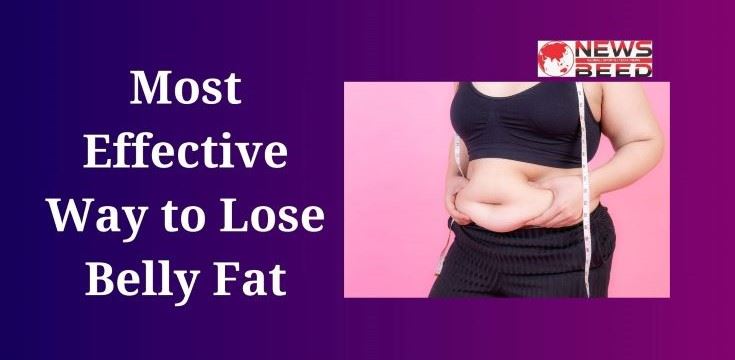Most Effective Way to Lose Belly Fat: Losing belly fat effectively requires a multifaceted approach that combines a healthy, balanced diet with regular exercise and lifestyle modifications. Nutritionally, focusing on whole foods, reducing intake of processed foods, sugars, and trans fats, while incorporating more lean proteins, fiber-rich vegetables, and healthy fats can help manage weight and reduce abdominal fat. Exercise-wise, a combination of cardiovascular activities, strength training, and core exercises can enhance metabolism and target the abdominal area. Additionally, ensuring adequate sleep, managing stress levels through mindfulness or meditation, and staying hydrated are essential components for achieving and maintaining a healthy weight. Implementing these strategies consistently over time is key to reducing belly fat and improving overall health.
Table of Contents
ToggleMost Effective Way to Lose Belly Fat
Losing belly fat is a common goal for many people, as it not only affects appearance but also has implications for health. Excess abdominal fat, particularly visceral fat that surrounds your organs, can lead to serious health problems like cardiovascular disease, type 2 diabetes, and certain cancers. This comprehensive guide, divided into sections, will outline the most effective strategies for reducing belly fat, focusing on a multi-faceted approach that includes diet, exercise, lifestyle changes, and understanding the underlying causes.
1. Eat Plenty of Soluble Fiber
Soluble fiber absorbs water and forms a gel that helps slow down food as it passes through your digestive system. Studies have shown that this type of fiber promotes weight loss by helping you feel full, so you naturally eat less. It may also decrease the number of calories your body absorbs from food. Good sources of soluble fiber include flaxseeds, avocados, legumes, blackberries, and Brussels sprouts.
2. Avoid Foods That Contain Trans Fats
Trans fats are created by pumping hydrogen into unsaturated fats, such as soybean oil. They’re found in some margarines and spreads and also often added to packaged foods. These fats have been linked to inflammation, heart disease, insulin resistance, and abdominal fat gain in observational and animal studies. To help reduce belly fat and protect your health, read ingredient labels carefully and stay away from products that contain trans fats.
3. Don’t Drink Too Much Alcohol
Alcohol can have health benefits in small amounts, but it is seriously harmful if you drink too much. Research suggests too much alcohol can also make you gain belly fat. Observational studies link heavy alcohol consumption to a significantly increased risk of developing central obesity — that is, excess fat storage around the waist. Cutting back on alcohol may help reduce your waist size.
4. Eat a High-Protein Diet
Protein is an essential nutrient for weight management. High protein intake increases the release of the fullness hormone PYY, which decreases appetite and promotes fullness. Protein also raises your metabolic rate and helps you retain muscle mass during weight loss. Be sure to include a good protein source at every meal, such as meat, fish, eggs, dairy, whey protein, or beans.
5. Reduce Your Stress Levels
Stress can make you gain belly fat by triggering the adrenal glands to produce cortisol, also known as the stress hormone. Research shows high cortisol levels increase appetite and drive abdominal fat storage. Engage in pleasurable activities that relieve stress, and practicing mindfulness or yoga could be effective methods.
6. Don’t Eat a Lot of Sugary Foods
Sugar contains fructose, which has been linked to several chronic diseases when consumed in excess. These include heart disease, type 2 diabetes, obesity, and fatty liver disease. Observational studies show a relationship between high sugar intake and increased abdominal fat. It’s important to realize that more than just refined sugar can lead to belly fat gain. Even healthier sugars, such as real honey, should be used sparingly.
7. Do Aerobic Exercise (Cardio)
Aerobic exercise (cardio) is an effective way to improve your health and burn calories. Studies also show it is one of the most effective forms of exercise for reducing belly fat. However, results are mixed as to whether moderate or high intensity exercise is more beneficial. In any case, the frequency and duration of your exercise program are more important than its intensity.
8. Cut Back on Carbs — Especially Refined Carbs
Reducing your carb intake can be very beneficial for losing fat, including abdominal fat. Diets with under 50 grams of carbs per day cause belly fat loss in overweight individuals, those at risk of type 2 diabetes, and women with polycystic ovary syndrome (PCOS). You don’t have to follow a strict low-carb diet. Some research suggests simply replacing refined carbs with unprocessed starchy carbs may improve metabolic health and reduce belly fat.
9. Perform Resistance Training (Lift Weights)
Resistance training, also known as weight lifting or strength training, is important for preserving and gaining muscle mass. Based on studies in people with prediabetes, type 2 diabetes, and fatty liver disease, resistance training may also be beneficial for belly fat loss. In fact, one study involving overweight teenagers showed that a combination of strength training and aerobic exercise led to the greatest decrease in visceral fat.
10. Get Plenty of Restful Sleep
Sleep is important for many aspects of your health, including weight. Studies show that people who don’t get enough sleep tend to gain more weight, which may include belly fat. A 16-year study in more than 68,000 women found that those who slept less than five hours per night were significantly more likely to gain weight than those who slept seven hours or more per night. The condition known as sleep apnea, where breathing stops intermittently during the night, has also been linked to excess visceral fat.
You May Also Read:
What is Digital Marketing in Hindi
SEO Interview Questions and Answers
What is Affiliate Marketing Meaning
Google Search Console Interview Questions And Answers
Conclusion:
The most effective way to lose belly fat involves a combination of a healthy diet, regular physical exercise, and lifestyle modifications. Focusing on whole foods, such as fruits, vegetables, lean proteins, and whole grains, while reducing the intake of processed foods, sugary beverages, and high-calorie snacks, can significantly impact abdominal fat reduction. Incorporating regular cardiovascular exercises, strength training, and high-intensity interval training (HIIT) can also help in burning belly fat more efficiently. Additionally, getting adequate sleep, managing stress levels, and staying hydrated are crucial lifestyle factors that support overall weight loss, including the reduction of belly fat. It’s important to note that spot reduction is not effective, and a holistic approach targeting overall body fat reduction is key to losing belly fat.
FAQs:
1. What causes belly fat?
A: Belly fat can be caused by a variety of factors, including poor diet, lack of exercise, stress, genetics, and poor sleep patterns. Consuming more calories than you burn leads to fat accumulation, and certain foods high in sugars and fats can contribute significantly to belly fat.
2. Is it possible to target belly fat specifically with exercises?
A: While you cannot target belly fat loss specifically through exercise (a concept known as spot reduction), a combination of cardiovascular exercises, strength training, and core workouts can help reduce overall body fat, including belly fat.
3. What are the best exercises to lose belly fat?
A: High-intensity interval training (HIIT), aerobic exercises (like walking, running, swimming), and core strengthening exercises (like planks, crunches, and Russian twists) are effective. Consistency and variety in your workout routine can help reduce overall body fat.
4. How important is diet in losing belly fat?
A: Diet plays a crucial role in losing belly fat. Focusing on a balanced diet rich in lean proteins, whole grains, fruits, vegetables, and healthy fats, while avoiding processed foods, sugary beverages, and high-fat items, is essential for fat loss.
5. Can stress contribute to belly fat?
A: Yes, stress can contribute to belly fat. High stress levels can lead to an increase in cortisol, a hormone that can promote fat storage in the belly area. Managing stress through relaxation techniques, adequate sleep, and physical activity is important.
6. Does sleep affect belly fat?
A: Poor sleep can affect body weight and fat distribution. Lack of sleep can disrupt hormonal balance, leading to increased appetite and a preference for high-calorie foods, contributing to belly fat.
7. Are there any specific foods that help reduce belly fat?
A: While no single food can target belly fat, some foods can help boost metabolism and reduce overall body fat. These include high-fiber foods, lean proteins, and foods rich in polyunsaturated fats, such as fish, nuts, and seeds.
8. How does alcohol consumption affect belly fat?
A: Excessive alcohol consumption can contribute to weight gain, including an increase in belly fat, due to its high calorie content and the tendency to eat more while drinking.
9. How long does it take to lose belly fat?
A: The time it takes to lose belly fat varies depending on individual factors such as diet, exercise routine, lifestyle, and genetic predisposition. Consistency and a holistic approach are key; results can start to show in a few weeks to a few months.
10. What are the health risks associated with belly fat?
A: Excess belly fat is associated with a higher risk of health issues such as type 2 diabetes, heart disease, certain types of cancer, and metabolic syndrome. Reducing belly fat can significantly lower these risks.




